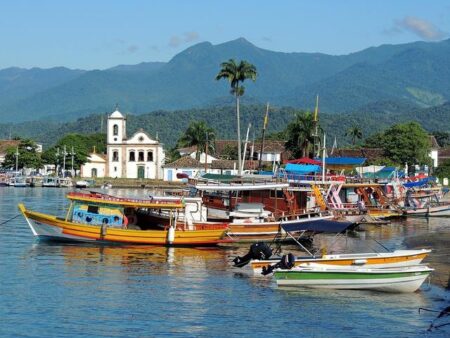The trial investigating the attempted coup led by former Brazilian President Jair Bolsonaro has resumed amid renewed attacks from former U.S. President Donald Trump and far-right factions in Brazil. As proceedings continue to examine the events surrounding Bolsonaro’s efforts to overturn the 2022 election results, supporters aligned with fascist ideologies have stepped up their efforts to intimidate the judiciary and undermine the democratic process. This latest phase of the trial underscores the persistent threat posed by authoritarian movements both within Brazil and internationally, highlighting the broader challenges facing democratic institutions in the region.
Bolsonaro Coup Trial Resumes Amid Rising Political Tensions in Brazil
As the trial against Jair Bolsonaro advances, the political atmosphere in Brazil grows increasingly volatile. The former president faces charges linked to his role in the January 8th, 2023 attacks on democratic institutions, with prosecutors alleging a calculated attempt to undermine Brazil’s electoral system. Meanwhile, Bolsonaro’s defense continues to draw emboldened support from far-right factions both inside and outside Brazil, including public endorsements from former U.S. President Donald Trump. These dynamics have amplified fears of escalating political violence and a potential erosion of democratic norms in the region.
Key elements shaping the ongoing trial and its broader implications include:
- Political Alliances: Bolsonaro remains strongly aligned with nationalist and fascist groups, whose increasing public demonstrations signal a continued challenge to Brazil’s judiciary.
- International Influences: Trump’s vocal defense of Bolsonaro reflects a wider pattern of global right-wing solidarity, which contributes to polarizing debates within Brazil.
- Judicial Integrity: Despite intense pressure, Brazil’s courts have reaffirmed their commitment to upholding the rule of law, navigating an environment riddled with threats and misinformation.
- Public Sentiment: Widespread protests both supporting and condemning Bolsonaro reveal a deeply divided population, intensifying the stakes of the legal proceedings.
| Stakeholder | Role | Impact on Trial |
|---|---|---|
| Jair Bolsonaro | Defendant | Central figure accused of coup attempt |
| Donald Trump | Supporter | Amplifies far-right rhetoric internationally |
| Brazilian Judiciary | Trial overseer | Ensures legal process amid pressure |
| Far-Right Groups | Protesters | Fuel political instability |
Trump’s Support Fuels Far-Right Violence Targeting Democratic Institutions
Support from former US President Donald Trump has emboldened far-right extremists who are escalating violent attacks aimed at undermining democratic institutions. These groups, often inspired by Trump’s rhetoric and alliances with ultranationalist figures globally, have intensified efforts to disrupt political processes through intimidation and physical aggression. Their actions pose a significant threat to the rule of law, contributing to a dangerous erosion of electoral integrity and judicial independence in multiple democracies.
Recent incidents linked to this wave of far-right violence include:
- Storming and vandalism of government buildings.
- Coordinated harassment campaigns targeting opposition politicians and activists.
- Mobilization of paramilitary-style groups openly threatening election officials.
| Country | Incident | Impact |
|---|---|---|
| United States | Capitol Hill riot | Government disruption and arrests |
| Brazil | Political trial interference | Threatened judicial processes |
| Europe | Far-right protests | Violent clashes and chaos |
Experts Call for Strengthened Legal Protections to Safeguard Brazil’s Democracy
Leading constitutional lawyers and political analysts have urgently urged the government to implement more robust legal frameworks aimed at fortifying democratic institutions in Brazil. In their assessment, current laws are insufficient to counter rising authoritarian threats that exploit legal loopholes to destabilize the state. Experts emphasize the need to:
- Enhance judicial independence to ensure impartial adjudication free from political interference.
- Strengthen electoral safeguards to prevent manipulation and coercion.
- Expand protections for civil rights against intimidation by extremist groups.
These recommendations come as Brazil faces unprecedented pressure from far-right factions, emboldened by international figures undermining democratic norms. Scholars argue that immediate legislative reforms combined with vigilant civic engagement are indispensable to preserve the rule of law. A comparative overview highlights the vulnerabilities:
| Vulnerability | Current Status | Suggested Reform |
|---|---|---|
| Judicial Appointment | Politicized process | Merit-based selection committee |
| Election Oversight | Limited transparency | Independent monitoring bodies |
| Freedom of Assembly | Subject to arbitrary restrictions | Clarified rights and penalties for suppression |
In Conclusion
As the trial concerning the alleged coup attempt by former Brazilian President Jair Bolsonaro resumes, the political climate remains charged, intensified by vocal support from former U.S. President Donald Trump and far-right factions within Brazil. The proceedings not only highlight deep divisions within Brazilian society but also underscore the growing transnational connections among nationalist and authoritarian movements. Observers will be closely watching how the judiciary navigates these pressures and what the trial’s outcome may signal for Brazil’s fragile democratic institutions moving forward.




